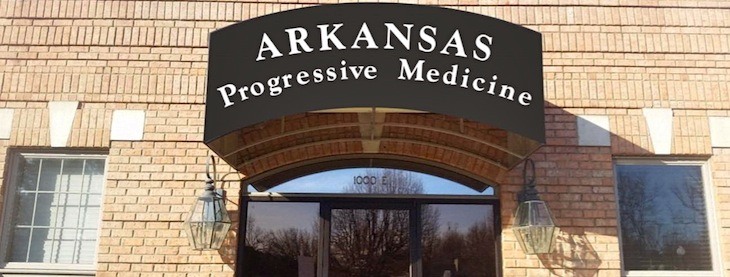Jonesboro clinic hopes to help patients statewide acquire medical marijuana cards
by August 7, 2017 3:24 pm 3,133 views

Dr. Dane Flippin was on vacation in California in November 2016 when Arkansas voters decided to allow medical marijuana in the Natural State. The Searcy native researched the issue and soon learned patients with certain medical conditions could benefit from cannabis consumption.
There was one problem back in his home state, however.
A doctor has to clear a patient to receive a medical marijuana card and many doctors are unable or unwilling, Flippin told Talk Business & Politics. He decided earlier this year to open Arkansas Progressive Medicine, a Jonesboro-based clinic that specializes in qualifying patients for those cards. To date he’s examined about 100 patients, but he expects the number to grow exponentially once the medical marijuana dispensaries open, perhaps later this year, he said.
“You don’t have to be a doctor to tell the miserable from the not miserable,” Flippin said. “If there is something that will help a patient, I’m a doctor and I’m going to let you know about it. … I thought it would be fun to be a pioneer and a champion for this cause.”
Legal marijuana sales will be a significant boon to the economy in the coming years. About $7.2 billion in legal cannabis sales were recorded nationwide in 2016, according to New Frontier Data, an analytics firm that specializes in the cannabis sales sector. Those numbers are expected to jump by at least 17% this year, and within 10 years legal cannabis could be a $40 billion industry employing nearly half a million workers directly or indirectly.
Arkansas’ market is expected to surpass $67 million by 2025. Arkansas will represent a relatively small portion of total U.S. market sales amid other, larger states implementing medical and recreational use in the near future. By 2025, Arkansas is projected to account for just 0.3% of all legal cannabis sales in the U.S.
ADH began accepting applications for medical marijuana registry identification cards on June 30. As of July 21, ADH spokeswoman Karen White told Talk Business & Politics, there have been 222 completed and approved applications since state health officials began receiving those submissions at the beginning of July. That tally is updated by ADH every Friday, White said.
For a patient to receive medical marijuana, they have to get a one-year card from the Arkansas Health Department. To get the card, the patient has to have one of the specific 18 conditions approved for treatment. Those conditions include cancer, seizures, chronic pain, and others. Doctors paid with federal dollars may be hesitant to sign off on a patient’s card because marijuana is still classified as an illegal drug by the federal government. There is a stigma still attached to cannabis for some doctors, and they don’t want to be involved for personal reasons, he said.
Patients are typically vetted by phone first to see if they have a qualifying condition. If they do, an office visit is arranged. Flippin will ask them about their medical history and what other medications they’ve taken in the past. Qualifying patients receive a recommendation that is forwarded to the Arkansas Department of Health. Flippin does not take Medicare or Medicaid payments so there are no federal money issues for him. This allows his overhead to be low.
He offers patients information on what to expect at the dispensaries, and what the boundaries are for cannabis-based medications. He also educates them about over-the-counter supplements that have some cannabis properties that can aid with insomnia and other conditions.
Another reason why doctors hesitate when it comes to cannabis is control, he said. Doctors control the medications their patients consume, but the dispensaries work differently. When a patient gets a card they go to the dispensary and someone there suggests what products are best to use. Adjustments to usage are determined by the patient and those at the dispensary, not necessarily the doctor, he said.
Flippin’s clinic has been open for more than three months, but he hasn’t paid himself. He’s been a doctor for more than 20 years. He works in the NEA Baptist Memorial Hospital emergency room a few times a week to pay his bills. He expects a groundswell to begin – soon.
“As a doctor I’ve always tried to find medications that work for my patients. From the research I’ve done there is no doubt medical cannabis works,” he said.
Link here for the ADH frequently asked questions page.
